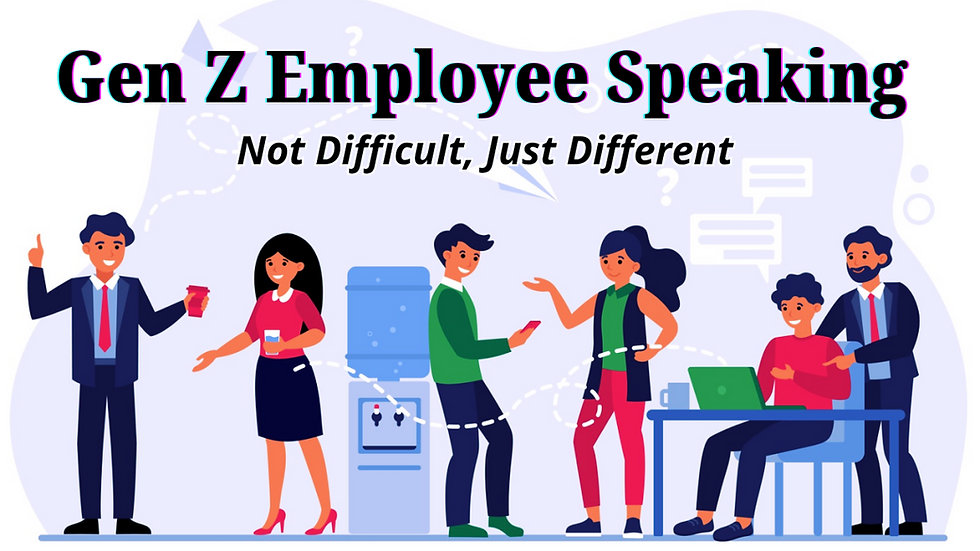Behind the Smile: Understanding and Coping with Depression at the Workplace
- Nishchay Motadoo

- Jul 7, 2025
- 4 min read

Meet Krish: The Face You See, The Battle You Don’t
Every morning, Krish walks into the office at 9:00 AM sharp, dressed immaculately, coffee in hand. To his colleagues, he’s polite, competent, and quietly efficient. But what they don’t see is the storm beneath his calm surface.
Krish wakes up every day with a heavy chest and a sense of dread. The alarm feels like a threat, not a reminder. Getting out of bed takes all the energy he has. Even the thought of brushing his teeth or deciding what to wear can be overwhelming. He stares at the mirror, but doesn’t recognize the person looking back.
At work, Krish struggles to concentrate. Reading emails takes longer than it used to. Small tasks feel mountainous. Meetings drain him, though he nods along and takes notes. When colleagues laugh in the lunchroom, he forces a smile but feels completely detached. He avoids social events, citing “just a bit of work” as an excuse.
He often stares at his screen, not because he’s busy, but because he’s too numb to move. Every mistake he makes feels amplified. A minor feedback feels like an indictment. Even praise doesn’t register anymore—it feels undeserved. By the end of the day, he’s emotionally exhausted.
When he goes home, he doesn’t talk much to his wife. His young daughter wants to play, but he says, “Daddy is tired.” He scrolls through his phone blankly, skips dinner, and lies in bed staring at the ceiling. Sleep is either too little or too much.
Understanding Depression: It’s Not Just Sadness
Depression is often misunderstood as “being sad” or “not trying hard enough.” But it’s far more than that. It’s a clinical condition that affects the brain, body, emotions, and behavior. People with depression may feel:
Constant fatigue or low energy
Loss of interest in things they once enjoyed
Difficulty concentrating
Feelings of worthlessness or guilt
Changes in appetite or sleep
Thoughts of hopelessness
In the workplace, depression may show up as absenteeism, decreased productivity, poor communication, or irritability. But it can also be completely hidden, like in Krish’s case, where the person performs just enough to avoid detection but is struggling immensely inside.
How Depression Affects Work and Family Life
At Work:
Reduced Performance: Krish’s attention to detail is slipping. He misses deadlines, and his creativity has plummeted.
Low Motivation: He’s no longer proactive. He avoids new projects and doesn’t contribute in meetings.
Team Impact: His withdrawal affects collaboration. Others assume he’s being cold or disengaged.
Burnout Risk: Pushing through without addressing his emotional health leads him closer to complete burnout.
At Home:
Emotional Disconnection: Krish’s emotional numbness makes it hard to connect with his spouse and daughter.
Communication Breakdown: He finds it hard to express how he feels, which creates tension and confusion at home.
Ripple Effect: His mood affects the overall environment. His family feels helpless, walking on eggshells.
Coping Strategies: Finding Light in the Fog
Overcoming depression is not about “cheering up” or “snapping out of it.” It requires awareness, support, and often professional intervention. Here are some practical strategies—explained with relatable examples:
1. Acknowledge the Problem
Why it helps: The first step is admitting that something isn’t right.
Example: One day, Krish finds himself staring blankly at a report for two hours. That night, instead of brushing it off, he tells his wife, “I think I’m not okay. I feel like I’m sinking.” Just saying it aloud brings a strange sense of relief.
2. Seek Professional Help
Why it helps: Therapists or psychiatrists can provide structured support, coping tools, or medication when necessary.
Example: Krish’s wife gently encourages him to speak to a therapist. After a few sessions, he begins to understand the roots of his feelings and starts learning how to cope with negative thoughts. He’s not “fixed,” but he’s not alone.
3. Build Small Routines
Why it helps: Depression thrives in chaos and stagnancy. Predictable routines create structure and momentum.
Example: Krish starts by committing to a 10-minute morning walk, followed by journaling one positive thought daily. Small wins build confidence.
4. Talk to a Trusted Person at Work
Why it helps: Support at work can reduce stress and shame.
Example: Krish finally confides in his manager, who listens without judgment. Together, they adjust his workload temporarily and set boundaries on after-hours emails.
5. Practice Self-Compassion
Why it helps: Depression often comes with a harsh inner critic. Being kind to oneself can change the tone of that internal dialogue.
Example: When Krish misses a deadline, instead of calling himself “useless,” he reminds himself: “I’m unwell, but I’m trying. That’s enough for today.”
6. Engage in Meaningful Activities
Why it helps: Joy can feel distant, but engagement—especially in things that connect us to others—can reawaken it.
Example: Krish volunteers for a weekend reading session at a local children’s library. The laughter of children slowly chips away at the emotional numbness he’s been feeling.
7. Educate and Involve the Family
Why it helps: Depression can isolate, but shared understanding creates connection.
Example: Krish and his wife attend a couple’s therapy session. They learn to communicate better. His daughter starts drawing pictures that say, “Daddy, I love you.” The guilt begins to ease.
You Are Not Alone
Depression at the workplace doesn’t always look like tears or dramatic breakdowns. Often, it looks like Krish—showing up every day while feeling empty inside. It can affect performance, relationships, and health—but it doesn’t have to define a person’s life.
Help is available. Healing is possible. And most importantly, you are not alone.
Let’s normalize conversations around mental health at work—because behind every polished LinkedIn profile might be someone silently fighting a battle like Krish.
If you or someone you know is struggling with depression, reach out to a mental health professional. Talking can change everything.




Comments